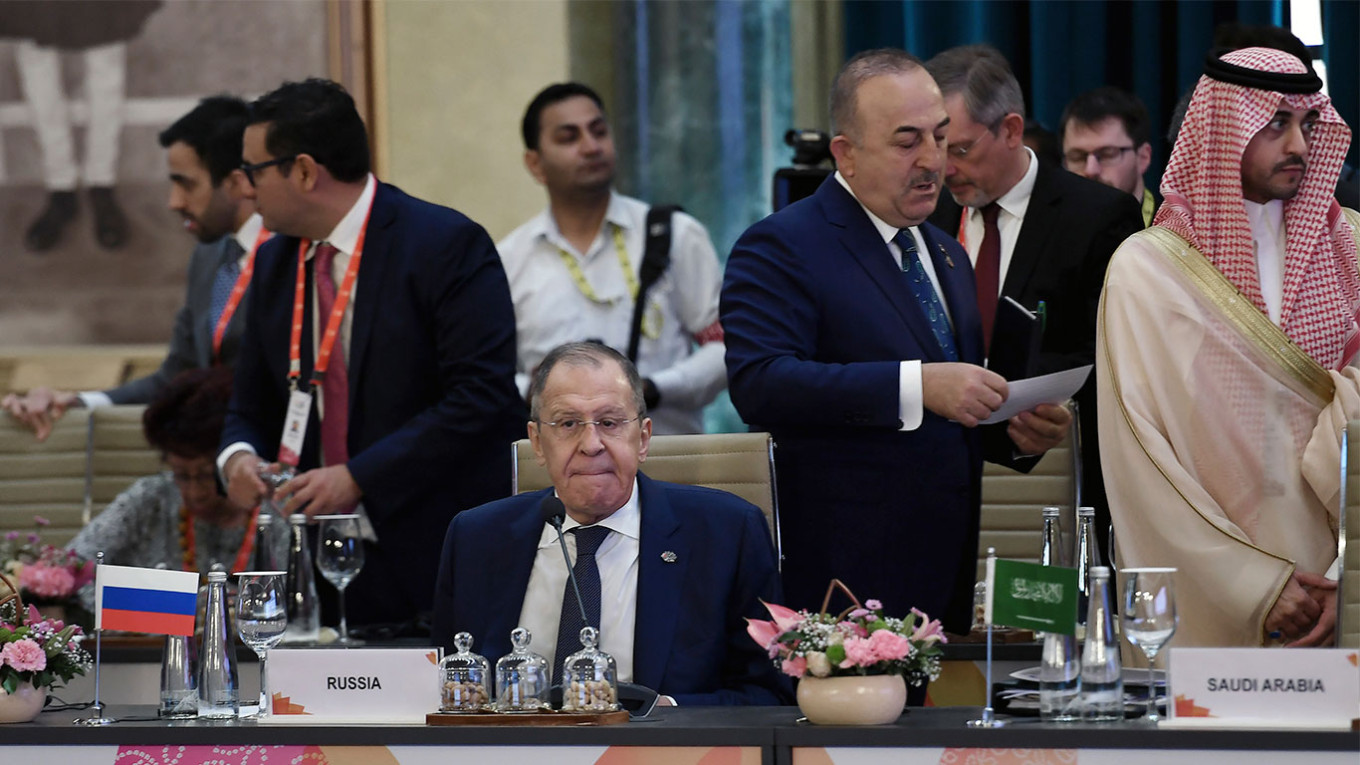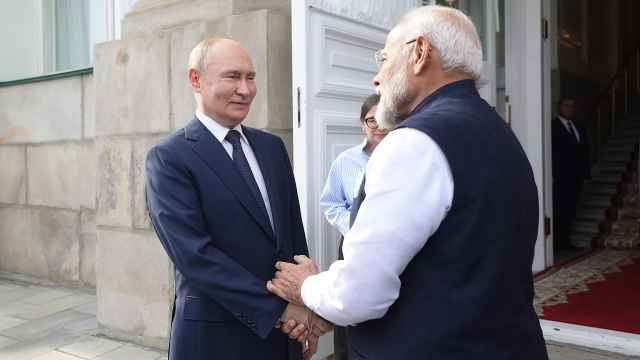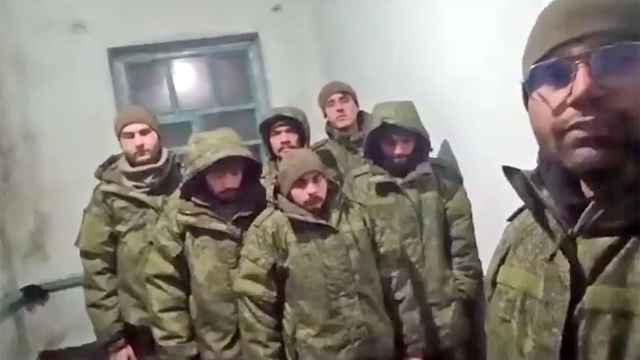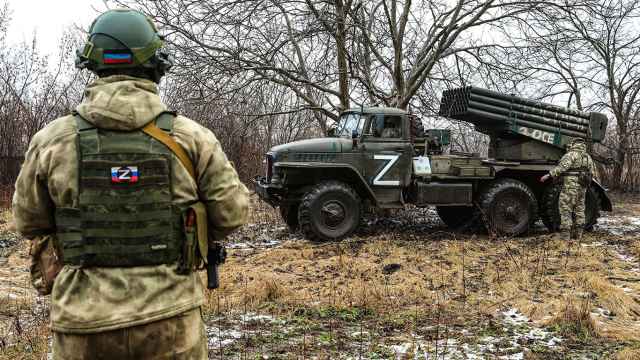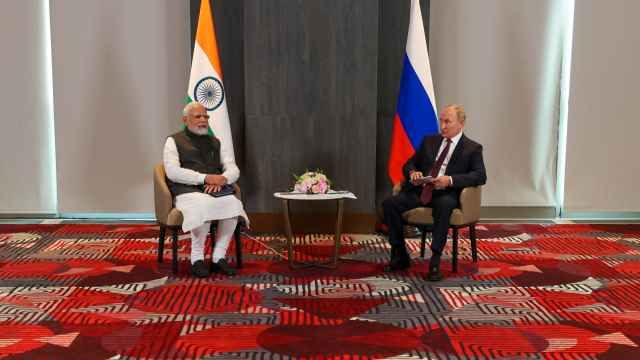The United States and Russia met in their highest face-to-face contact since the invasion of Ukraine last year on the sidelines of a G20 meeting that ended in disarray due to divisions over the conflict.
U.S. Secretary of State Antony Blinken and Russian Foreign Minister Sergei Lavrov spoke briefly at the meeting of the world's top diplomats in New Delhi, which failed to reach a joint final declaration after objections from Moscow and Beijing.
Blinken reaffirmed Washington's commitment to protecting its ally Ukraine in order to "disabuse the Russians of any notion that our support might be wavering," a U.S. official said on condition of anonymity.
The last time Blinken and Lavrov were in the same room — at a G20 meeting in Bali last July — the latter stormed out, according to Western officials.
Until Thursday, there had been no high-level face-to-face contacts between the U.S. and Russian governments since Moscow invaded Ukraine in February 2022, with Washington firmly backing Kyiv and spearheading international efforts to isolate Russia.
Russian diplomatic spokeswoman Maria Zakharova sought to downplay the significance of the encounter, telling state news agency RIA Novosti that Blinken had initiated it and that it had been fleeting.
Lavrov "spoke to him, standing, as part of the second session of the G20," she said. "No talks or real meeting took place."
No joint statement
Thursday's G20 meeting drew to a close without a joint statement — the second such meeting of the bloc to fail to reach an accord in as many weeks.
Lavrov told the assembled foreign ministers that Western representatives had derailed the meeting in an effort to scapegoat Russia for their own failings, disrespecting efforts by the Indian hosts to reach agreement on other issues.
"I want to apologize to the Indian presidency and to our colleagues from countries of the global South for the obscene behavior of some Western delegations, which have turned the G20's agenda into a farce," Lavrov said, according to Russian news agency TASS.
Discussions over the joint statement faltered on several issues including Russia's insistence on an investigation into the sabotage of the Nord Stream pipeline last year, Lavrov told reporters through an interpreter.
Russia and Western countries have traded accusations of responsibility for the September explosions.
A statement issued at the conclusion of the G20 meeting showed China had joined Russia in refusing to support the bloc's demands that Moscow cease hostilities in Ukraine.
Both countries were the only G20 members not to agree to the statement demanding Russia's "complete and unconditional withdrawal."
A meeting of G20 finance ministers in the Indian city of Bengaluru last week had also failed to agree on a common statement after Russia and China sought to water down language on the war.
Western delegates fear China is considering supplying arms to Russia and said ahead of the summit they intended to discourage Beijing from intervening in the conflict.
Since Russia's invasion of Ukraine, China has framed itself as a neutral party, while retaining close ties with its strategic ally Russia.
Beijing has reacted furiously to the claims it may be contemplating arms transfers, and in February it issued a position paper calling for dialogue to resolve the conflict.
'There were divergences'
Russia's war in Ukraine crowded out other agenda items at the meeting of the Group of Twenty, which comprises the world's 19 largest economies and the European Union.
The differences frustrated India, which said it wanted to use its year as host to focus on issues such as alleviating poverty and climate finance.
"On the issue, which very frankly concerned the Ukraine conflict, there were divergences, there were differences, which we couldn't reconcile," Indian Foreign Minister S. Jaishankar told reporters as the meeting concluded.
Earlier in the day, Indian Prime Minister Narendra Modi said global governance had "failed" and urged attendees to come together for the sake of developing countries not represented there.
"As the leading economies of the world, we also have a responsibility for those who are not in this room," he added.
While India shares Western concerns about China, it is also a major buyer of Russian arms and has ramped up Russian oil imports.
India has not condemned the invasion of Ukraine, Modi told Russian President Vladimir Putin last year this was "not a time for war."
A Message from The Moscow Times:
Dear readers,
We are facing unprecedented challenges. Russia's Prosecutor General's Office has designated The Moscow Times as an "undesirable" organization, criminalizing our work and putting our staff at risk of prosecution. This follows our earlier unjust labeling as a "foreign agent."
These actions are direct attempts to silence independent journalism in Russia. The authorities claim our work "discredits the decisions of the Russian leadership." We see things differently: we strive to provide accurate, unbiased reporting on Russia.
We, the journalists of The Moscow Times, refuse to be silenced. But to continue our work, we need your help.
Your support, no matter how small, makes a world of difference. If you can, please support us monthly starting from just $2. It's quick to set up, and every contribution makes a significant impact.
By supporting The Moscow Times, you're defending open, independent journalism in the face of repression. Thank you for standing with us.
Remind me later.


